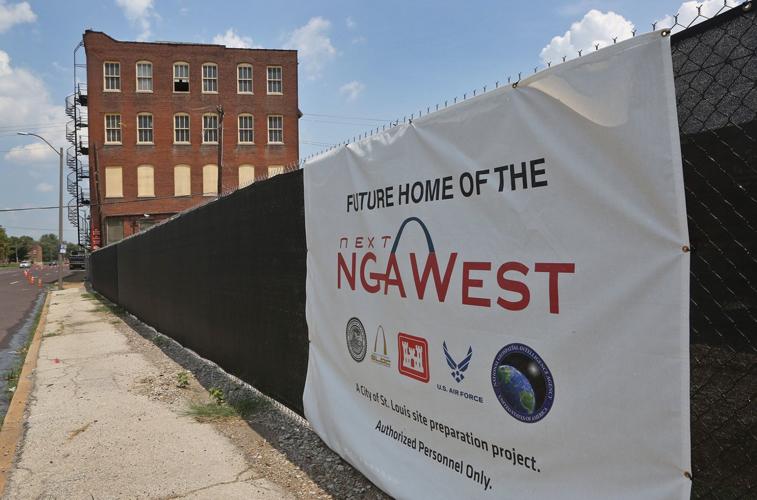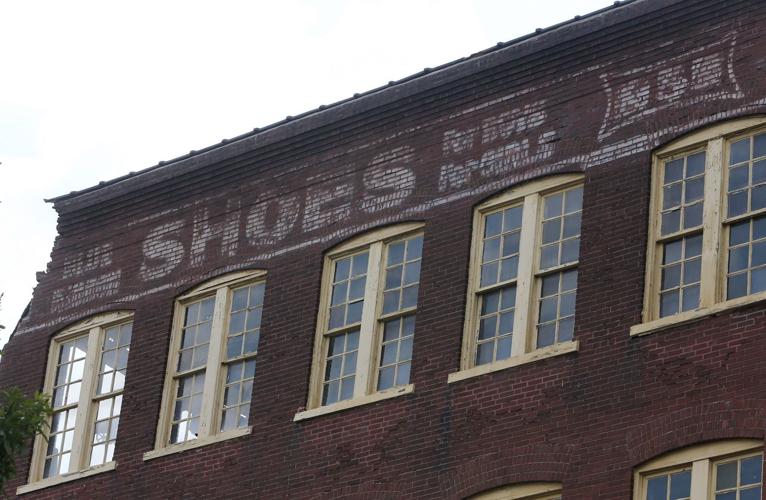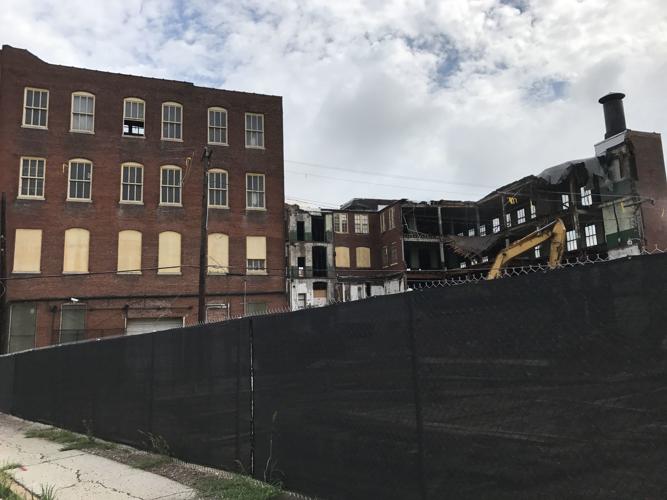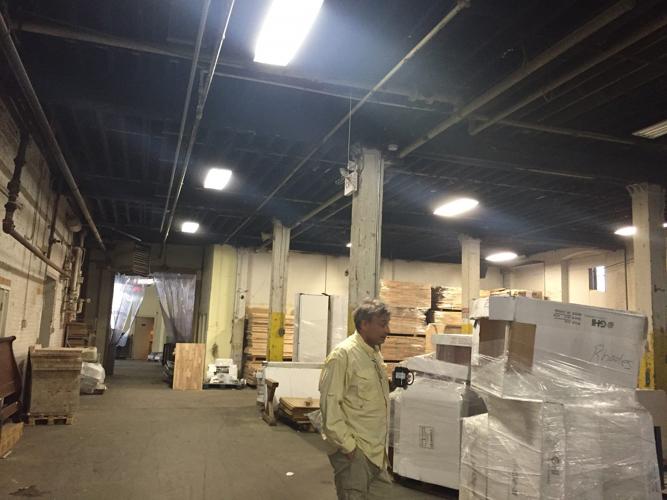├█č┐┤½├Į officials alleged Wednesday that a transaction between a property owner in the footprint of the National Geospatial-Intelligence AgencyŌĆÖs planned western headquarters and developer Paul McKee was designed to inflate sale values in a scheme to procure more state tax credits.
The allegations came out at a trial in ├█č┐┤½├Į Circuit Court to decide a long-running challenge to the value of a property the city acquired by eminent domain as it was assembling land for the NGAŌĆÖs future campus in north ├█č┐┤½├Į.
Jim Osher, building at Jefferson and Cass avenues, has been fighting the city for two years over its acquisition of the property.
People are also reading…
Osher pointed to a $3.75 million sale to McKeeŌĆÖs Northside Regeneration company in 2011 as evidence of the buildingŌĆÖs value, which his attorney argued was now closer to $5 million. Osher had acquired the building at 1516 North Jefferson Avenue for about $200,000 in the 1990s.
The cityŌĆÖs Land Clearance for Redevelopment Authority, which acquired property for the NGA project, argued the value is closer to $573,000. A commission to decide value for eminent domain ended up paying a little more than $800,000 after it was acquired for the NGA project in 2016.
But Ryann Carmody, an attorney representing the LCRA, told the jury that the sale with McKee was not a sale at all. She argued in court that it was designed to trigger to McKee the state disbursement of distressed area land assemblage tax credits, a now defunct state program that McKee lawyer Steve Stone helped write.
ŌĆ£The higher the purchase price, obviously, the higher the tax credits McKee gets,ŌĆØ Carmody said.
while it was operational earlier this decade. While other developers could qualify, McKee was the primary beneficiary as he assembled land for his touted Northside Regeneration project over the last decade.
Little work has been done except for . But McKee argues the NGA deal would not have happened if he hadnŌĆÖt started assembling a large chunk of land in north ├█č┐┤½├Į. He was the first to submit a proposal for the NGA to relocate from south ├█č┐┤½├Į to the area, which LCRA director Otis Williams testified ŌĆ£got the ball started.ŌĆØ But the city ultimately took the reins of assembling the remaining land for the site and years earlier.
The land assemblage program allowed McKee to receive tax credits worth 50 percent of the value of purchases he made in the Northside footprint. It also disbursed credits to reimburse interest costs and brokerage fees.
Carmody presented emails in opening arguments illustrating negotiations between Osher and McKee for a 2011 sale of the Buster Brown building to McKee. She said no money changed hands and Osher seller-financed the property, asking only for half of the tax credits McKee received from the state.
At one point, McKeeŌĆÖs broker contacted Osher to raise the purchase price by several hundred thousand dollars.
ŌĆ£We, the buyer, are going to increase this purchase price,ŌĆØ she said, pointing the jury to an email from McKee affiliates.
Osher continued renting the building from McKee, but there was little demand for payment from either party in the interim ŌĆö Osher for principal on his loan or McKee for rent, Carmody said.
ŌĆ£PaulŌĆÖs never paid, JimŌĆÖs never paid Paul for rent,ŌĆØ Carmody said.
In 2015, as the NGA negotiations heated up for property in the area, Osher and McKee agreed to unwind the purported sale, giving it back to Osher.
McKee had reaped about $2 million in tax credits from the transaction, Carmody said. Osher got $591,000.
OsherŌĆÖs lawyer, Tracy Gilroy, said the Buster Brown sales price was higher because of growing redevelopment momentum in the area and because it was a key corner in McKeeŌĆÖs redevelopment footprint.
ŌĆ£What a willing seller would sell this building for has everything to do with what that building can be,ŌĆØ she said.
Howard Smotkin, an attorney representing Northside Regeneration, called the Buster Brown property ŌĆ£a critical piece ŌĆö a corner piece,ŌĆØ in an email to a reporter Wednesday seeking comment from McKee on the allegations.
ŌĆ£The allegation that the purchase price for the Buster Brown Building, or any other real estate acquired in North ├█č┐┤½├Į by Northside Regeneration, was inflated for purposes of the Distressed Area Land Assemblage Tax Credits is not true,ŌĆØ SmotkinŌĆÖs email continued. ŌĆ£With or without the tax credits, it was always in our financial interest to pay as little as possible. All purchases were the product of reasoned business decisions.ŌĆØ
According to Smotkin, Northside Regeneration contends it didnŌĆÖt believe it overpaid for the property and that it was denied tax credits on the purchase ŌĆ£but paid Osher an initial installment of approximately $600,000.ŌĆØ
ŌĆ£We were severely criticized for quietly buying at more affordable prices before our activities were made public, and now we are being accused of overpaying following the announcement of our land assemblage activities,ŌĆØ he wrote.
The Post-Dispatch asked the Missouri Department of Economic Development, which administered the tax credit program, whether the tax credits were clawed back, but the department declined to comment.
By the end of the day, ├█č┐┤½├Į Mayor Lyda Krewson had weighed in.
ŌĆ£I am shocked at these very serious allegations,ŌĆØ Krewson said in a tweet. ŌĆ£We are committed to investigating these claims thoroughly and taking appropriate action.ŌĆØ
The state senator who represents the area, Sen. Jamilah Nasheed, D-├█č┐┤½├Į, also criticized McKee, saying he ŌĆ£took tens of millions of dollars from taxpayers, and all ├█č┐┤½├Į has to show for it are acres of mud.ŌĆØ
ŌĆ£I have no patience for developers pocketing millions from the state of Missouri through fraudulent tax credits,ŌĆØ Nasheed said in a tweet. ŌĆ£Paul McKee owes the people of Missouri an explanation, but first he owes them $40 million.ŌĆØ
The cityŌĆÖs attorneys also alluded to evidence of a similarly structured transaction between McKee and Osher to procure tax credits by inflating another buildingŌĆÖs value.
That 2012 transaction was for a building on Magazine Street, west of the NGA area. There, Osher transferred a building he had bought a year earlier for $35,000 to McKeeŌĆÖs Northside for $2.94 million. Again, the city says it has evidence that tax credits were the only compensation paid and the sale was later ŌĆ£unwound,ŌĆØ according to court documents.


















